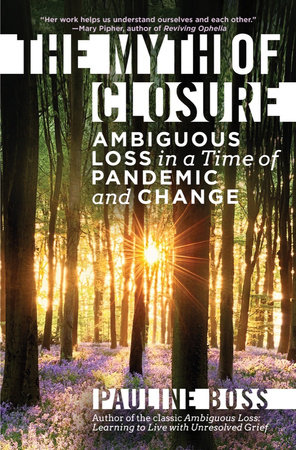Joshua Coleman sat down with Pauline Boss to talk about her latest book, The Myth of Closure: Ambiguous Losses in a Time of Pandemic and Change.
Why did you write this book? I wrote it because I strongly believe there is no closure after the loss of someone you love. From my 40 plus years of working with ambiguous loss around the world, I learned about the myth of closure, people who love relatively well despite living with a loss that has no clarity or official verification. So, I wanted to write a book about this misuse of the term closure for some time.
I started this book several years ago, but then my husband required care and I set the manuscript aside. After he died in 2020 (of a stroke, not COVID), and the shutdown from COVID continued, I picked up the manuscript again and finished the book. What surprised me is that it’s now a very different book from the one I began writing several years ago. It is personal, it’s about topics I never addressed before (personal ambiguous loss, racism, climate change). Importantly, it’s not a therapy book, but I hope it’s therapeutic– for whomever reads it, ordinary readers as well as professionals. After nearly two years of pandemic, political upheaval, and racial injustice and disparities, people are highly distressed, if not traumatized, right now, and need help. This book does not pathologize or offer a medical model, but rather is more social psychological and a way of thinking that is stress based and meant to help us cope with this unprecedented time of trouble.
(1) Why is closure a myth? Isn’t that what people want after loss?
Closure is a perfectly good word in real estate or when a road is closed after a flood, but it’s a hurtful word in human relationships. Using it after loss makes people think there will be an end to the pain, but in fact, we live with grief and don’t get over it. Of course, it is lessened over time, but we keep the lost person in our heart and mind. Closure is not necessary nor achievable. Often, it is a misnomer in that what people really yearned for which is clarity, certainty, or justice about one’s loss. People want the certainty of loss, proof, justice not closure.
(2) What is ambiguous loss and how does it differ from losses with a clear finality such as a validated death?
Ambiguous loss is an unclear loss that has no resolution. There are two kinds: Physical and psychological. Examples of physical ambiguous loss are soldiers missing-in-action, children kidnapped, migrants who disappear, etc. More common examples of physical ambiguous loss result from divorce and adoption. The lost person is gone, but not for sure. There is no proof of death.
Psychological ambiguous loss results when the person is present, but their mind or memory is disappearing. Examples are Alzheimer’s disease the and the over 80 other illnesses or conditions that lead to dementia. The person is there but not there.
(3) What ambiguous losses have we experienced during the pandemic and how do they affect us? Physically, we have lost the ability to touch those we love, to be with them in the hospital or care facility when they are ill or dying. Until recently, young people have been separated from friends and classmates, while rituals of life, such as weddings and funerals have been limited to just a few people or virtual events. Psychologically, we have lost trust in the world as a fair and safe place, we have lost our feelings of safety when out among the public, etc. The book goes into this more.
(4) if the pandemic (or another crisis) forces us to adapt and change, is that a good thing? Well, the pandemic is not a good thing, but learning to adapt and change is a good outcome to a bad situation. It increases our resilience and our tolerance for ambiguity so we can better cope with other troubles that may come down the road. (5) And why might some people refuse to change and adapt to crises, (wear a mask, get vaccinated) while others adapt and change? Some people remain absolute thinkers when the problem is ambiguous. The virus is invisible, the scientists understandably can’t talk in absolutes, the losses remain unclear– so if one is an absolute thinker, you pick an absolute answer to the trouble. In this case that means, “It’s a hoax, I don’t need to wear a mask, nor get vaccinated. It’s all about MY freedom, not my community.” Such absolute thinking is also evident when people say, “You’re either for me or against me;” “People are either dead or alive; there is no ambiguity,” so they declare a missing person dead prematurely and they don’t’ see the in between, the nuance.


Comments